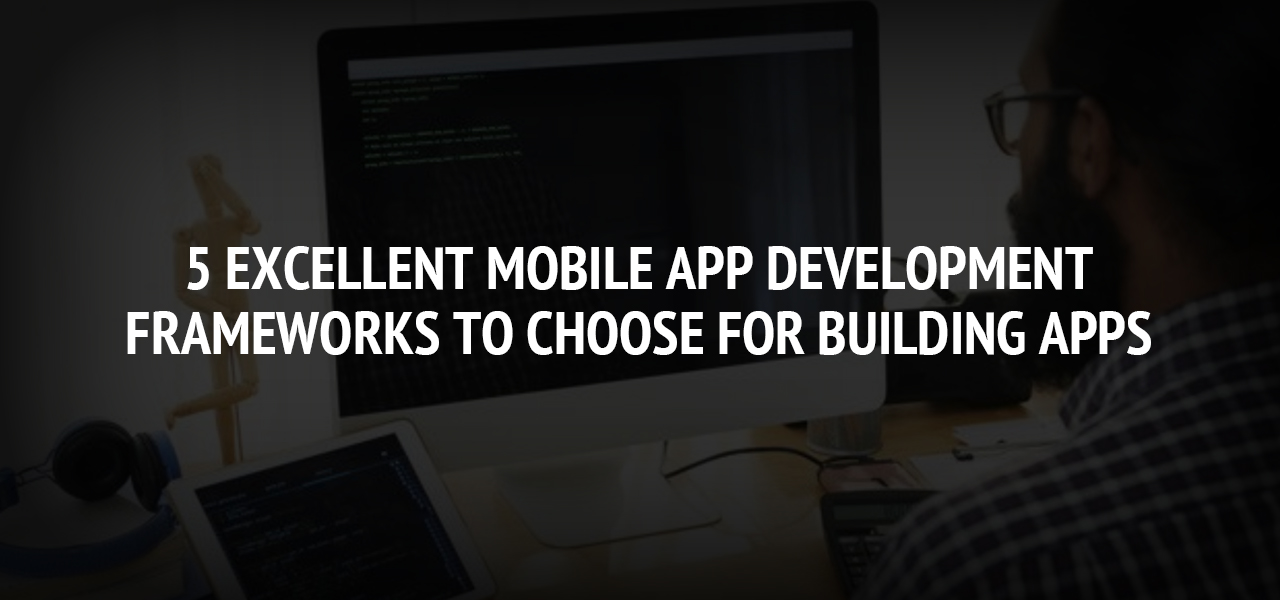5 Excellent Mobile App Development Frameworks to Choose for Building Apps

Most businesses now cannot think of digitizing their business without having an online and mobile presence. While many of the small and medium businesses just consider having a mobile website is enough to keep pace with the increasing competition on the digital landscape, mobile websites are losing popularity over dedicated mobile apps for more effective marketing.
To your amazement, without just spending a fortune you can build your own native app for the business, and for this, you have a plethora of powerful mobile app development frameworks. Here we are going to present the top 5 mobile app development frameworks for building high-quality apps at a low budget.
Ionic
Ionic is an HTML based open-source framework that is widely used for developing cross-platform mobile apps. The framework is widely popular among the app developers principally because it comes loaded with an array of UI elements for modern apps. Some of these pre-loaded elements include web forms, list views, search filters, tab bars, and navigation menu in the respective UI design.
Thanks to these ore-loaded elements developers can keep their concentration and focus largely on the core app development than creating an attractive and user-friendly UI. Another positive aspect of the framework is that it comes with a very low learning curve and any developer versed with CSS, JavaScript, or HTML can easily start using the Ionic framework.
Let's have a quick look at the key benefits of using the Ionic framework for mobile app development.
- Very low learning curve and easier for adoption.
- It is an open-source, free framework for building apps that can run on both iOS and Android.
- It comes loaded with an array of UI building elements.
- Ionic is developed using a robust and reliable technology called AngularJS.
- Ionic is known for its great app performance and faster loading speed.
- Building a sophisticated Ionic based app doesn't require spending a fortune.
- Ionic also offers Cordova Plugins to allow access to all mobile device features such as GPS, Flashlight camera, and several others.
PhoneGap
PhoneGap is a cross-platform mobile app development framework which is also known in the name of Apache Cordova. The technology gained huge popularity in all these years because it allows delivering a fully native user experience while the same app works on both iOS and Android platforms.
PhoneGap allows using the same codebase for building two app versions for Android and iOS platforms. The most important thing is PhoneGap comes with features that allow easy access to the native device functions.
Xamrin
Xamrin is one of the most popular cross-platform app development frameworks that comes with a lot of unique advantages. This is the framework that allows developers to use C# code for a multitude of mobile platforms such as Android, iOS, and Universal Windows apps.
The best thing about Xamatin is that it ensures a fully native app performance. Developed and nurtured by Microsoft the framework already enjoys the backing of a robust community of developers amounting to 1.4 million.
Let's have a quick look at the key benefits of Xamarin for mobile app development.
- Xamarin ensures superb native user interface and platform-specific controls for an app that works on multiple platforms.
- Xamarin coming with access to Visual Studio offers everything you need for building cross-platform apps that work on both iOS and Android platforms. Xamarin allows using the same codebase for Windows, Android, and iOS app as well as web apps.
- Xamarin is a highly flexible framework that allows for easier API Integration.
- Xamarin allows compiling code in a way so that you can use the same multiple times.
- Xamarin has a huge community base spread all over the globe. There are several third-party websites and repositories for resources of all types that developers can access.
React Native
React Native is one of the most popular and widely used cross-platform mobile app development frameworks which is used by both small business startups as well as large apps belonging to Fortune 500 companies. React Native well known for reusability of the same codebase for multiple platforms and lower learning curve, helps building robust cross-platform apps at a faster pace.
React native utilized JavaScript in such a way that developers don't need to learn any other complicated languages for building apps for both iOS and Android platforms. Since React Native code is turned to native views, it allows delivering really smooth animation for the mobile apps on both platforms.
Let's have a quick look at the key benefits of the React Native framework for cross-platform app development.
- Reusability of the codebase across multiple platforms and app projects give React Native developers so much flexibility and ease.
- Because of using virtual DOM and because of the reusability of the codebase, the React Native app projects are finished faster than others. It is a kind of framework that speeds up the development process in an unprecedented way.
- React Native is actually a JavaScript library loaded with a lot of resources and tools that developers can utilize for specific development needs.
- Created and nurtured by Facebook React Native has the strong support of a large and active developer community spread all over the globe.
Flutter
Flutter is the relatively newer entrant in the cross-platform mobile app development space. Created and maintained by Google Flutter is a complete app development kit with an array of advantages for the cross-platform app projects. From faster coding, flexible modification by using widgets to the reusability of code, Flutter offers everything that cross-platform app projects need.
Let us have a quick look at the key benefits of Flutter.
- Flutter comes with a hot reloading feature to evaluate and update an app with features in real-time.
- Flutter offers all kinds of design-centric elements for shaping the look and feel of the app on both platforms.
- Flutter comes with built-in support for a whole array of IDEs to allow optimum flexibility for developers.
- Flutter comes with an inbuilt Unit Testing code to help developers in the testing and QA process.
- Built by Google Flutter already has become a tremendously popular cross-platform development framework with a rapidly increasing community of developers.
- The framework offers comprehensive documentation for the developers to get help throughout their projects.
Conclusion
All the major cross-platform mobile app development frameworks we mentioned here have one thing in common. They allow reusing code and makes development easier with a lot of built-in tools and elements. As minimizing development time without compromising on the user experience has become the focus of most app projects, these frameworks just look befitting to such requirements.
About The Author
Related Blog
View All-
What is the best time to post to Instagram?
There are many myths about the right time for posting. The recommendations are similar: the best are called morning (10 hours) and evening (18-20 hours) weekdays. Sometimes they mention the inefficiency of publications on the weekend - which could be relevant before ...
-
5 Best Sites to Buy TikTok Live Video Viewers (Real & Safe)
Within the changing world of social media marketing, TikTok has become an effective platform for businesses and content providers to interact with viewers via live video streaming. Real-time viewer connectivity presents a special chance to encourage genuine conversations ...







